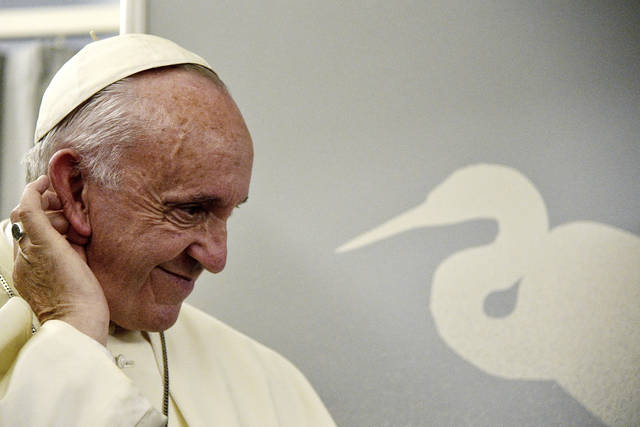ABOARD THE PAPAL PLANE — Pope Francis on Saturday defended his silence in Myanmar over the plight of Rohingya refugees, saying a public denunciation would have “slammed the door in the face” of his hosts and prevented his message from being heard.
Francis said he chose instead to speak in general terms about human rights in public so that he could engage more frankly in private about what the U.N. has said is a textbook campaign of ethnic cleansing against Myanmar’s Muslim minority.
Speaking to reporters en route home from Myanmar and Bangladesh, Francis said he was “very, very satisfied” that his message had been received in his private meetings with Aung San Suu Kyi and Myanmar’s powerful military chief, Gen. Min Aung Hlaing.
“It’s true I didn’t have the pleasure of slamming the door in their face publicly with a denunciation,” Francis said. “But I had the satisfaction of dialogue, and letting the other side dialogue, and in this way the message arrived.”
Human rights groups and Rohingya themselves had expressed disappointment that Francis had declined to even refer to the Rohingya by name, much less call out Myanmar’s military for sparking Asia’s worst refugee crisis in decades. Francis waited until he arrived in neighboring Bangladesh to demand the international community intervene to resolve the crisis and help Bangladesh cope with the influx of more than 620,000 refugees fleeing a military crackdown in Rakhine state.
Francis finally uttered the word “Rohingya” at an emotional encounter Friday with a group of refugees who travelled from camps in Cox’s Bazar to Dhaka.
Francis said he was well aware of the criticism leveled at Suu Kyi for having failed to speak out enough, or soon enough about the atrocities being committed against the Rohingya. But he said it was difficult to judge what is possible in a country undergoing a political transition after decades of military dictatorship. He said in such cases, it’s likely that a country will make “two steps forward, one step back” as it progresses.
“So the possibilities have to be evaluated through this optic,” he said.
Despite his apparent sympathy toward Suu Kyi’s tenuous position in dealing with the Burmese military, Francis said he made sure his true feelings were known in private, especially during his meeting Monday with the general, who is responsible for what the army says are “clearance operations” against Rohingya militants in Rakhine.
“I didn’t negotiate the truth,” Francis said. Without divulging the contents of the private encounter, Francis said: “I did it in such a way that he understood that it’s not viable to redo today the way things were done in the past.”
“It was a good meeting,” he added. “Civilized. And even there, the message arrived.”
Francis also confessed that he wept during his encounter with Rohingya refugees on Friday, in which he begged their forgiveness for the hurt they had endured and the “indifference of the world” to their plight.
“The presence of God today is also called ‘Rohingya,’” he told them, finally pronouncing the word “Rohingya” in public.
Francis said he hadn’t planned how the encounter would unfold, and at one point got mad because it appeared the organizers were going to kick the Rohingya out after they greeted him. Francis said they deserved to hear something from him directly, and so he asked for a microphone and spoke from the heart.
“What did I feel?” he asked. “In that moment I cried. I tried not to show it.”
He added: “They wept too.”
———
Follow Nicole Winfield at www.twitter.com/nwinfield


